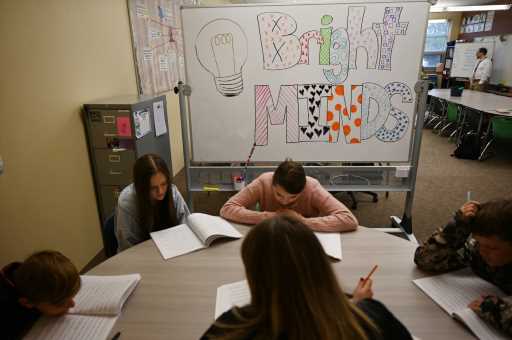Polis signs school finance act, buys down negative factor
Colorado paid down its deficit to public education to its lowest level since 2010 while also creating a separate fund for special education under a pair of laws signed by Gov. Jared Polis on Thursday.
The Public School Finance Act, or HB22-1390, is one of the few must-pass bills taken up by the legislature this year. In it, lawmakers increased per-pupil funding by $545 for the next school year and cut the deficit in constitutionally required public education funding from $503 million to $321 million.
Lawmakers originally aimed to eliminate the Great Recession-era deficit, known as the budget stabilization factor, but the spike in inflation nixed those plans, sponsor Sen. Rachel Zenzinger, an Arvada Democrat, said. Still, they hailed the buy-down as historic — especially coming two years after pandemic uncertainty kicked it past $1 billion.
“The school finance act did make a record investment in buying down the BS factor,” sponsor Rep. Julie McCluskie, a Dillon Democrat, said, theatrically emphasizing the acronym for the deficit. “That nasty thing that has been haunting us now for more than a decade. And we want to commit to being able to buy that off in the next year or two.”
Polis said the increased funding will help schools increase teacher pay, add workers to reduce class sizes and help restore programs cut in previous years, although the state cannot tell school boards specifically how the money is spent.
Amie Baca-Oehlert, president of the Colorado Education Association, celebrated the buy-down of the deficit, while noting it’s still not gone. Now entering its 13th year, that means a high school senior will have gone the tenure of their K-12 education in Colorado without fully funded education, she said.
Meanwhile, pay, class sizes and broader stresses are taking their toll on the profession, she said. In a recent survey, two-thirds of CEA members said they considered leaving the profession at the end of this school year, Baca-Oehlert said.
“We’re hopeful districts will use this increase in funding to provide adequate pay for our educators so they don’t have to work two or three jobs to make ends meet,” Baca-Oehlert said.
Polis also signed a bill that specifically adds $80 million to special education in the state — an amount that Zenzinger, a teacher, called “transformational.” It creates a secondary fund to the school finance act to be distributed to school districts based on the number of students with special needs, and the depth of those needs.
“This bill, finally — I think it’s the first time in Colorado history, certainly in the time, decades, that I’ve been involved — really helps fund special ed in Colorado,” Polis said.
The money will better fill the gap between the federal standards for funding special education and the state’s commitment, although it won’t completely erase it, Zenzinger said. For the students with the greatest needs, it raises the funding gap from about 30% to 75%, she said.
“Truly it’s going to be transformational,” she said. “Districts have to provide these services, and they are, but they’re barely getting by. And so these additional resources will allow us to actually hire paraprofessionals or pay them a living wage so that classroom teachers have more supports.”
It in effect helps the general education budget, too, she said, because school districts won’t have to dig so deep to pay for special education needs.
Source: Read Full Article

